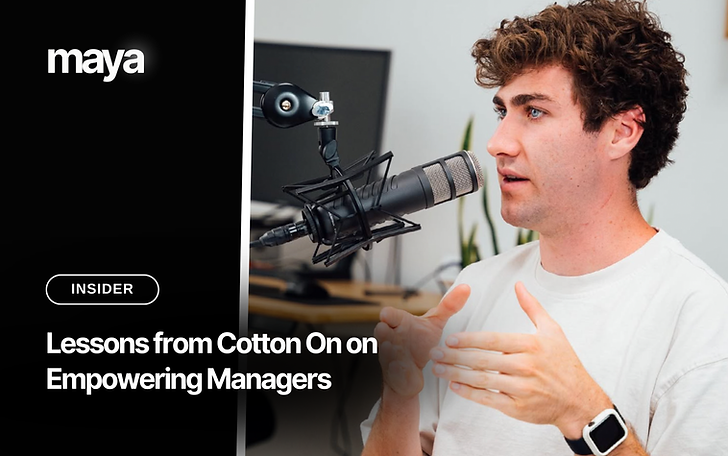Maya Research: The Business of Culture I 2026 I Download Now
Lessons from Cotton On and Chobani
on Empowering Managers
I DEEP DIVE INSIDER PROFILES
.png)
Managers sit at the center of culture. They connect strategy to daily reality, influence how teams experience work, and carry the weight of translating vision into results. But instinct alone isn’t enough. To lead with confidence, managers need the right mix of data, insights, and support.
At our recent People First Global event, Sam Chisholm, HR Manager Operations and Support at Cotton On, and Ashlee Thackeray, Organizational Development and Innovation Manager at Chobani, shared how their companies are equipping managers with the tools to lead with impact. Their stories show how building trust in managers, and backing that trust with actionable insights, creates stronger cultures from the ground up.
For Cotton On, one of Australia’s largest fashion retailers, consistency has been the anchor of its people strategy. With employees across offices, stores, and distribution centers, they has stayed true to a clear philosophy for the past five years: inspire, care for, and grow our people. Keeping the approach simple has given managers clarity on expectations while supporting a workforce that spans diverse roles and locations.
But managing across three distinct employee populations is no small feat. Cotton On managers are expected to put people first, and most do so with genuine care. Still, Sam knew that good intentions were not enough. Managers needed data to understand where engagement was strong and where teams were struggling. With support from Maya’s dashboards and reporting tools, managers began to see insights about their teams they had never accessed before.
The experience was eye-opening. For some leaders, the first engagement survey results were a moment of truth. “It can be a little confronting at times to look at the data and realize you don’t know what to do,” Sam admitted. “That’s when the coach’s hat comes on, and you lean into the tools.” Maya’s platform helped leaders break down employee sentiment into approachable pieces, revealing that engagement is shaped less by sweeping programs and more by daily interactions.
This realization gave managers new confidence. Engagement was no longer an abstract goal set by HR but something they influenced through what Sam calls “micro-moments” — the everyday conversations, feedback, and support managers provide. Cotton On’s first engagement survey became a turning point, showing leaders that small shifts in how they show up could significantly shape how employees feel. The insight spread across the business, even to individual contributors, who began to see engagement as something they could influence through how they interacted with peers.
.png)
At Chobani, the journey was different but the lessons were clearly similar. The culture was no longer that of a startup. With new layers of leadership, Chobani needed reliable employee experience data to help managers lead effectively.
When Ashlee joined the company, she saw an opportunity to position managers as the primary owners of culture. “We know that managers are the ones shaping our culture and therefore the employee experience. We see them as our first customer,” she said. Her approach was to ensure managers understood the purpose of engagement programs and felt equipped to act on the results themselves.
Ashlee described how her team introduced Maya’s surveys and then stepped back, putting results directly into the hands of managers. Department heads were given immediate access to dashboards after each launch, along with tools like templates and facilitation guides to help them run conversations with their teams. Ashlee and her team remained in the background as coaches, offering support when needed, but allowing managers to lead the process. “That’s where the magic happens,” she said. “When managers take ownership, the initiatives and ideas that come out of those workshops are far more impactful.”
The shift paid off. Managers began to see how small changes could create outsized impact. In one example, a Chobani team noticed lower-than-average wellbeing scores. Employees often sent emails late at night, creating an unspoken expectation of after-hours work. After reviewing the results, managers encouraged employees to schedule emails for the morning instead. The change was simple but immediately improved perceptions of work-life balance. “What we saw in the next pulse check was a real lift in wellbeing,” Ashlee explained. “It was something so small, yet so impactful.”
Both Sam and Ashlee emphasized that empowering managers is not about overwhelming them with data but giving them actionable insights and the confidence to act. At Cotton On, that meant helping managers see engagement as something they could directly influence in their day-to-day leadership. At Chobani, it meant handing managers the reins while supporting them with resources and guidance in the background.
Their stories illustrate a broader truth about leadership. Culture is not driven solely by HR teams or executive mandates. It is shaped by managers who make decisions in the moment, set the tone for how teams interact, and create the conditions for employees to thrive. By putting data in managers’ hands and trusting them to act, companies like Cotton On and Chobani are showing that the future of engagement lies in empowering those closest to the work.

.png)